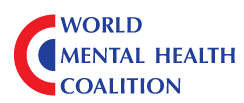Declaration of the Freedom of Mind
February 27, 2020
We at the World Mental Health Coalition believe that freedom of mind is a basic human right. It is at the core of all other freedoms and is fundamental to a working democracy. It is a primary sign of a healthy society, without which all rational systems break down. It is a right that is derived from the Declaration of the Rights of Man (1789) and the Universal Declaration of Human Rights (1948). We declare that the ignorance, neglect, or contempt of the human right to freedom of mind are the principal cause and product of public disempowerment and oppression by governments. People denied of agency become easy tools of those intent on ruling, rather than serving, them. When this happens, police and prisons are no longer necessary: people themselves enthusiastically enlist their own servitude.
We recognize that society, as a whole, is far from perfect in mental health and that a healing process is necessary for even the awareness of mental health matters to grow. This right, therefore, is provision as well as a striving. We aspire toward continually awakening in people their natural, unalienable, and sacred human right to freedom of mind, that political bodies should not abuse or suppress it. Social systems ought to protect and nurture it, while experts on the human mind may educate about applying the knowledge we have gained on human cognitive and emotional development. With this awareness, we believe that the people, based on the simple laws of nature, will be empowered to live out their full potential to the happiness of all.
Therefore the World Mental Health Coalition recognizes and upholds the following human right to freedom of mind:
- As stated in the United Nation’s Universal Declaration of Human Rights, all human beings are born free and equal in dignity and rights, endowed with the potential for reason and conscience and the obligation to act toward one another in a humane spirit.
- Everyone is entitled to make informed decisions for themselves. This means that the people shall have access to information and the best available knowledge, including expertise, so that they can make informed choices about health care, education, distribution of wealth, and organization of power or other decisions that affect them. Full access to information and knowledge also means an opportunity to develop psychologically and to actualize their critical thinking skills through education, nurturance, a knowledge-valuing environment, and secure conditions, free from encumbrance by misinformation, propaganda, thought reform, and other toxic substances to the mind.
- No one shall be held in mental slavery or servitude. When disinformation campaigns, mass manipulation through lying, and thought control poison the environment, mass hysteria and cults of personality result. There shall be no abridging of speech, of the press, or of access to expertise when the people desire peaceably to assemble around matters that affect their mental health. Mental freedom also means that the people have agency over their own minds and that their agency is protected; hijacking minds so that people willingly follow ideas that do not serve their interests is not compatible with mental freedom.
- Law is an expression of the general will. The people have a right to participate personally, or through a representative, in shaping laws that protect freedom of mind and prevent its slavery. Information from journalists, professionals, intellectuals, and whistleblowers increases freedom of mind and needs to be protected. Propaganda, mind control, and psychological abuse at large scale should be identified and curtailed, just as other forms of violence and abuse are punishable by law—especially since these deprivations are difficult to notice when many in a society or the society itself is victimized at the same time. Laws may also be put in place to protect wholesome environments that nurture children’s and adults’ ability to reach their full mental potential, with active input from mental health professionals regarding conditions that foster rather than impede mental health.
- Since freedom of mind is an inviolable and sacred right, no one shall be deprived of it, actively or passively. Children shall be provided healthy psychological development, safety and stability, and supportive education so that they may build intellectual and emotional capacity and self-reliance. Adults shall be treated with dignity, as beings capable of making reasoned and autonomous decisions for themselves, whereby no locus of control shall be external rather than internal, whether coerced or engineered. Hence forms the foundation of rational and thriving societies that can in turn engender healthy individuals.
Used with permission of WMHC member, Dr. Steven Hassan

